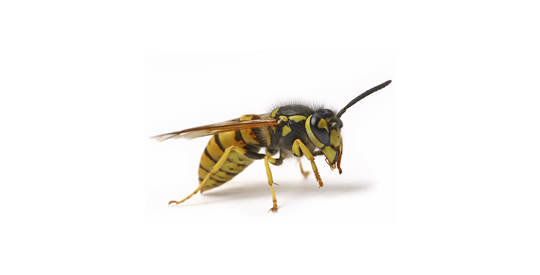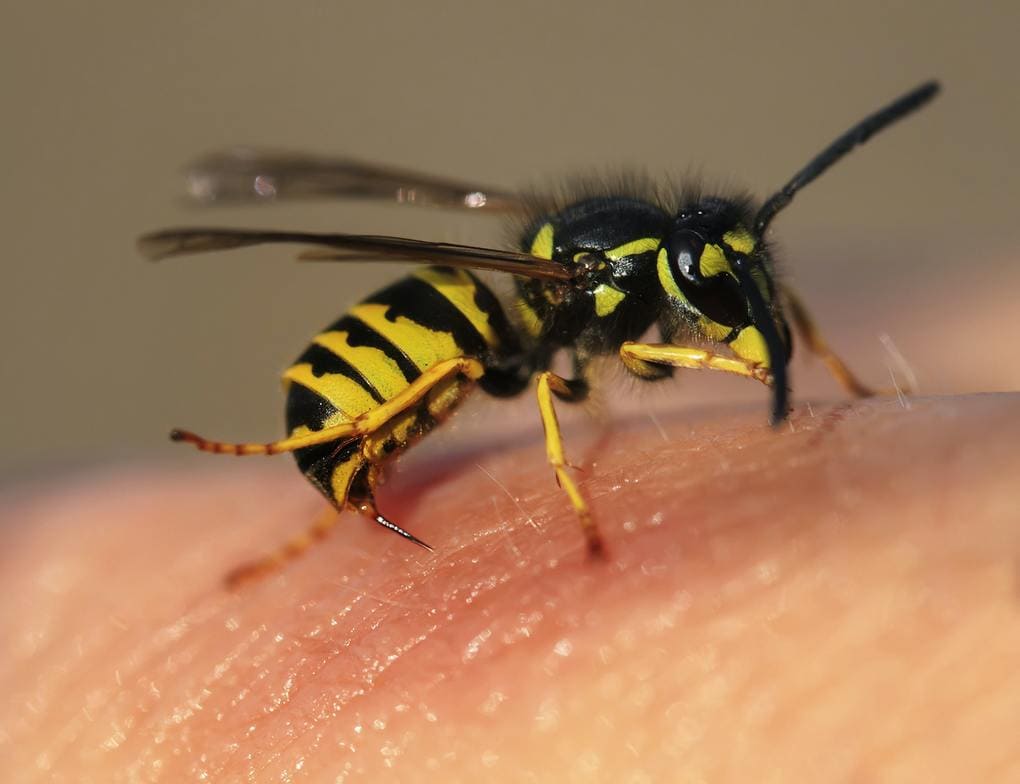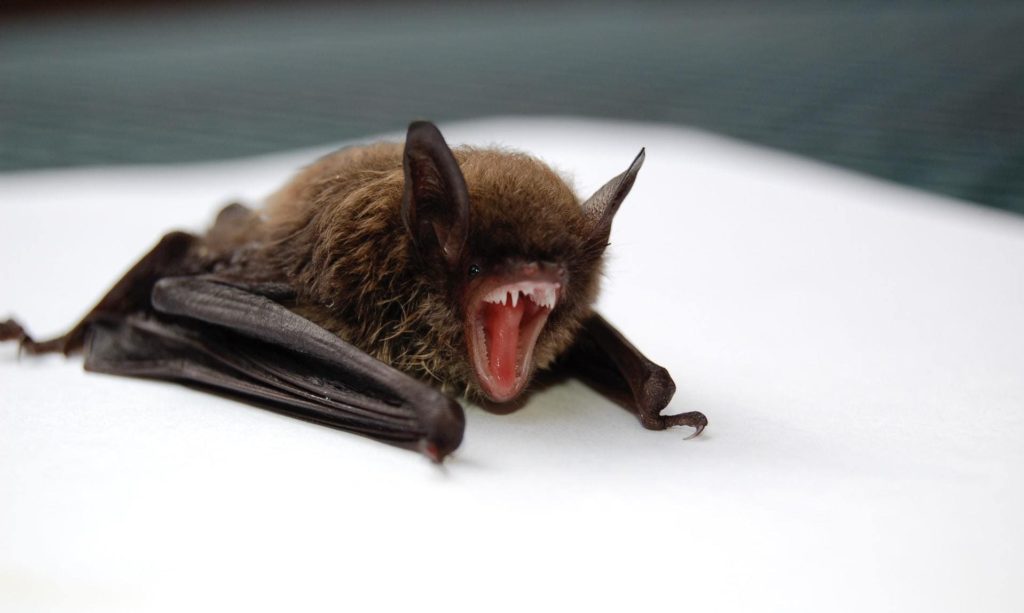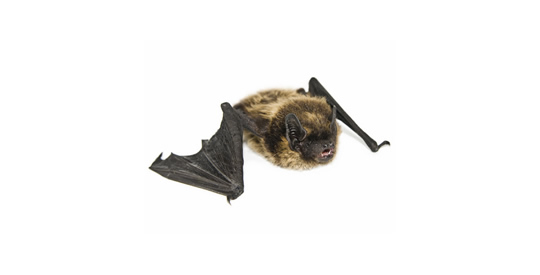Bee, Wasp, and Hornet Control Techniques:
After years of experience, Forsyth Wildlife has developed safe techniques used on a daily basis in controlling flying insects. Some of the techniques include the use of powder sprayers, wasp freeze, bee suits, bags, cutting tools, and heavy duty equipment. When dealing with one nest, multiple nests, or a sensitive area, Forsyth Wildlife has an appropriate solution that is safe for everyone and will allow the affected parties to continue on with their life as usual.
Bee Management and Removal
For the past 30 years, Forsyth Wildlife has encountered and solved thousands of problems with bees, wasps, and hornets. Forsyth Wildlife Recommends the use of a professional bee, wasp, and hornet removal company since these insects could cause serious physical harm.
Insect Stings
This is one of the most uncomfortable problems bees can carry. They can cause you stress especially if you or anyone in your family are allergic to bee or wasp stings. You can reduce the risk of being stung by calling Forsyth Wildlife to get rid of a bee nest in or near your home. We will assist you and give you ideas on how to deal with these animals when being outdoors.
Do I Have A Problem with Bees?
Whenever you see a bee nest in your property, you may have an infestation. You may also see bees entering a hole in the ground or in a wall or roof. This is time to call our Forsyth Wildlife professionals in their removal. We will help you identify the best solution: Depending on the species.
We will tell you if it is necessary to destroy the nest or not.
Some Species we Deal With:
- European Hornets
- Yellow Jackets
- Baldface Hornets
- Honey Bees
- Carpenter Bees
- Cicada Killers
- Red Wasps
- Bumble Bees
- Yellow Jacket Wasps
- Solitary wasps
Why Forsyth Wildlife
We have all the required experience and personal protective equipment needed to complete any bee job in a timely and professional manner. Whether the bee, wasp, or hornet nests are under ground, or 100 foot above it, our professionals have dealt with them in the past and are confident in even the most dangerous situations.
Best Treatment for Bees and Wasps
As for other species, treating the bee nest can be the only solution. You Forsyth Expert will assess your unique situation and tell you what kind of bees you have. We know that bees can be less aggressive than wasps. They will sting if they find themselves in a threatening situation.
Preparation
- We do not block the nest until after the treatment, this can be dangerous.
- Keep pets away from the area and close windows nearby.
- Bee activity around the entrance of the nest will increase for the first 24 hours, so people and pets should be kept away from the area until activity ceases.
We Use the Best Products
- Biodegradable
- Almost odorless
- They do not corrode or stain.
- They are not highly toxic for mammals but very effective for crawling and flying pests.
What to Do After a Forsyth Treatment?
- After treatment, bees and hornets can remain in a hyperactive state for a few hours.
- Their activity will end within 7 warm days.
- If you have cold or wet days, this may take longer.
Bats in Georgia
House Bats
The little brown bat and the big brown bat are often referred to as “house bats”. They can typically be found in buildings or even in your house in certain times of the year.These are the two most commonly found bats inhabiting human environments.Both species of bats feed primarily over wetlands and other bodies of still water where insects are abundant. Due to the favorable and moist climate conditions of Georgia, bats roost in buildings and structures.
Sometimes, big brown bats can be found hibernating in attics or basements in the winter season. And when you find both species at the same time, you can recognize them based on their size. Here are some characteristics so you can see the difference.
Little Brown Bat
• They can even be the size of a typical grain of uncooked rice, and you can find bigger ones too.
• These adult bats can be 2.5 to 4 inches long. This is, from nose to tail, about the size of an adult’s thumb.
• Their wing membranes are dark brown.
• Fur is dark brown and glossy on the back. Underneath, they are slightly paler and grayish.
Big Brown Bat
• They are larger in size about 4 to 5 inches in body length.
• Their fur has a silky look, and is typically chocolate brown in color.
• Their wing membranes, ears, feet and face are dark brown to blackish.
Signs of Bat Infestation:
If you see bats enter or leave your attic vents, you may have a bat at home. They move at or just after dusk.
If you hear scratching or squeaking sounds, especially at night.
Sound coming from your walls or attic.
Do you see droppings around your attic vents?
Have you noticed these signs? Maybe in your home or business? It is time to call professionals so call us and we recommend you not to attempt to evict the bats on your own.
When you are ready to evict these bats in a human way, call us.
Bat Management and Removal
Bad Odor in my Home or Place of Business
It is a common occurrence that animals die inside walls, in attics, or in other crawl spaces. One may confuse the smell with mold or mildew at the beginning, but the intensity of the smell of a decaying animal becomes overpowering and will last a long time. It is common for an owner to smell the odor when he/she enters from the exterior or from a different room, since one’s sense of smell will adjust to odors the longer the exposure to it. Forsyth Wildlife estimates the average smell will last from 4 weeks to 6 months if the animal carcass is not removed. It is worth mentioning that in some cases the smell will remain for months or years. The good news is that when a professional is hired to remove the carcass, the smell disappears in less than 24 hours providing it is the only dead animal. Removal and disinfection are two common practices of Forsyth Wildlife. Please call our company as soon as possible so you don’t have to tolerate foul odors for a long period of time.
Animals Chewing on Wires
It is very common to find rodents and other animals chewing on wires, cables, pipes, and other round objects, which represents a significant threat to property and health. There are two theories as to why animals chew round objects. The first is that animals chew round objects to keep their teeth small. Some animals, especially rodents, are known to have continuously growing teeth, and they are thought to have to chew objects so their teeth will still fit inside their mouths. The second theory is that animals chew round objects such as wires, cables, and pipes because they are similar to small trees, and by chewing small trees, animals are able to reach both seeds and fruits. Whatever the reason is, animals will damage property and environments while practicing their chewing. Combined with their impressive ability of getting into small spaces, animals, especially rodents, are extremely dangerous when they are chewing on round objects. In the state of Georgia, particularly in the cities of: Atlanta, Alpharetta, Marietta, Cumming, Johns Creek, Milton, Roswell, Duluth, Suwannee, Sugar Hill, Buford, Gainesville, Dawsonville, Dunwoody the population has experienced an unexpected increase in animal population due to the rapid growth and the massive land development clearing.









